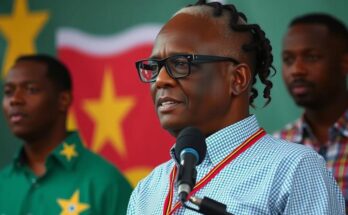Puerto Rico is holding general elections that may usher in historic changes with potential outcomes favoring either a third consecutive term for Jenniffer González (New Progressive Party) or a groundbreaking win for Juan Dalmau (Independence Party). Voter enthusiasm has surged despite previous trends of apathy, as public concerns about power outages, affordable housing, and the election’s symbolic aspects regarding political status are at the forefront of discussions.
Puerto Rico is currently experiencing a significant moment in its political history as it conducts general elections that could yield unprecedented outcomes. On the ballot are gubernatorial candidates Jenniffer González from the New Progressive Party and Juan Dalmau representing the Puerto Rico Independence Party and Citizen Victory Movement. Should González win, it will mark a third consecutive term for her party—a first in the island’s political landscape. Conversely, a victory for Dalmau would signify a groundbreaking achievement for a candidate from outside the two predominant political parties, which have held sway in Puerto Rican politics for decades. Candidate momentum has shifted over the years, particularly as a growing number of voters express discontent with the traditional political dichotomy. Recent polling places Jesús Manuel Ortiz of the Popular Democratic Party and Javier Jiménez of Project Dignity trailing behind the frontrunners. The election day witnessed long lines of voters undeterred by inclement weather, reflecting a renewed enthusiasm for political change. “I feel that for the first time, there is an opportunity for change,” expressed Jorge Hernández, a hopeful voter. As Puerto Ricans endure lengthy waits in line, their concerns about pressing societal issues such as education and housing are palpable. The rapid changes in voter engagement underscore a growing disillusionment with the prevalent bipartisan system. Additionally, voters on the island face a nonbinding referendum regarding Puerto Rico’s political status, which offers options ranging from statehood to independence. It remains to be seen how many eligible voters will emerge from past trends of apathy, yet there is a glimmer of hope amidst the uncertainty as participation could pave the way for a future marked by change.
The political landscape in Puerto Rico has historically been dominated by two major parties: the New Progressive Party (PNP), advocating for statehood, and the Popular Democratic Party (PDP), which supports the current territorial status. The growing influence of third-party movements, such as the Puerto Rico Independence Party and Citizen Victory Movement, against the backdrop of economic and political turmoil has resulted in increased voter interest and participation. The voting process in Puerto Rico uniquely includes a symbolic presidential vote and a referendum regarding the territory’s political status, which further complicates the electoral framework and voter expectations.
The elections in Puerto Rico present a momentous opportunity for transformative change within its political structure. With the potential for a candidate from an emerging party to assume leadership, or for one party to achieve an unprecedented third term, voters are signaling a desire for reform. As the island grapples with chronic socioeconomic issues, the electorate’s engagement could redefine future governance and the broader relationship with the U.S. government.
Original Source: apnews.com



